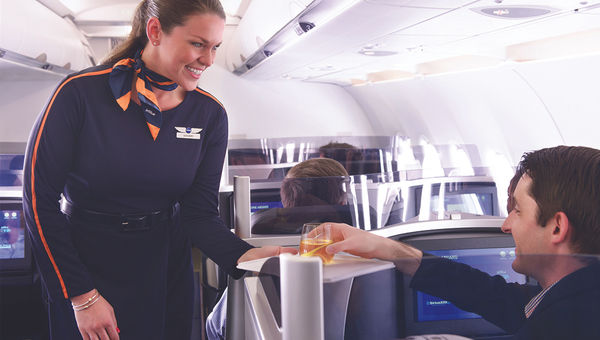Several issues and trends are likely to make news and impact airline travel as 2017 unfolds.
The big three U.S. airlines will continue to diversify their products
in 2017. Domestic airlines, especially regional and low-cost carriers,
will continue to grapple with the nationwide pilot shortage. Alaska and
Virgin America had their merger approved, and the entire industry will
look to see what impact the incoming Trump administration will have on
matters related to airline competition as well as the recently started
commercial airline service between the U.S. and Cuba.
In 2016, the major U.S. carriers moved in earnest with announcements
and rollouts of new fare classes and cabins as they fought to compete
with low-cost carriers on one hand and entice business and high-end
leisure customers on the other.
As a result, April will mark the beginning of United flights
featuring its basic-economy fare. Like Delta, which began the fare class
in 2012, flyers will trade discounted prices for tickets in the back of
the plane that can't be changed. But United has taken the product a
step further by forbidding carry-ons that can't fit under a seat. It
remains to be seen if Delta and American, which has said it will unveil
its own basic economy plan in 2017, will follow suit.
Analyst Bob Mann of R.W. Mann and Co. said he guesses Delta has
already concluded that basic economy isn't cannibalizing its
higher-priced corporate business.
As such, he said, Delta is unlikely to follow United's basic economy
lead when it comes to strict carry-on rules. That, in turn, could force
United to roll back the policy.
Next year will also see expansions and upgrades of higher-end
services on U.S. carriers. American, which debuted its international
premium-economy service on two routes in November, will expand the
offering, which bridges the large gap between international business-
and economy-class service.
Delta, meanwhile, plans to bring its Delta Premium to select
international routes in 2017, and United has hinted that it will
announce plans for international premium economy as well.

JetBlue will join the expansion and upgrades of higher-end services by offering lie-flat Mint cabins on select transcontinental flights out of Fort Lauderdale and San Diego.
Next year is also scheduled to mark the rollout of United's Polaris
international business-class cabins and Delta's all-suite Delta One
business-class cabins. In addition, JetBlue will begin offering its
lie-flat Mint cabin on select transcontinental flights out of Fort
Lauderdale and San Diego.
The pilot shortage
While airlines work to broaden their offerings, they'll also have to
keep an eye on the U.S. pilot shortage that in 2016 sent the regional
carrier Republic into bankruptcy, caused the closure of the small
SeaPort Airlines and forced other regional airlines to reduce routes.
Throughout the past year, regional airlines sought to address the
crisis with substantial pay raises and signing bonuses. For example,
Piedmont, PSA and Envoy, the wholly owned regional affiliates of
American, raised first-year pay by between 32% and 56%, according to
data provided by Dan Akins, founder of the consulting firm Flightpath
Economics. SkyWest, the largest regional airline in the U.S., raised its
first-year pilot pay in 2016 by 22%.
Despite the increases, Akins predicts that the pilot shortage will
increase next year amid growing demand among a widening variety of air
service operators. As a result, more regional airlines will go into
bankruptcy, while route reductions will mean that more small communities
will lose commercial air service entirely. Pilot supply will also
become an increasing concern for ultra-low-cost carriers Allegiant,
Frontier and Spirit, according to Akins.
"The first carrier to truly break the mold and train their own pilots
on the carrier's dime will be the change needed to begin to produce a
sustainable supply of air crews for the future," he said.
The Trump administration
This coming year will bring the $4 billion merger of Alaska Airlines and Virgin America following the deal's Dec. 6
antitrust
approval by the Obama administration. Airline industry observers will
be watching to see if Alaska decides to do away with the Virgin America
name or maintain it as a second brand, as CEO Brad Tilden said in June
was a possibility.
And with approval of the merger having been predicated on Alaska
giving up key codesharing routes with American, Mann said he'll be
watching to see whether the Seattle-based carrier looks toward organic
growth of its national network or whether it instead expands anew its
smaller codesharing partnership with Delta.
Other regulatory issues look likely to be left to the Trump administration to decide.
Though the president-elect spoke little of airlines during his
campaign, his protectionist views have caused some industry executives
around the world to express concern. But those views will also present
opportunities for certain carriers in 2017.
The Trump administration, for example, could receive with more
sympathy the request of United, American and Delta for a clampdown on
the U.S. expansion of the Gulf carriers Etihad, Emirates and Qatar,
which the U.S. legacy carriers accuse of accepting illegal government
subsidies.
Meanwhile, if Trump converts his tough posturing on Cuba into action,
2017 could bring tighter restrictions, or even a full cessation, of the
commercial airline service between the U.S. and its island neighbor.
"I expect that the Trump administration will increase enforcement,"
John Kavulich, president of the U.S.-Cuba Trade and Economic Council
said, referencing the 12 categories of travel under which Americans are
permitted to visit Cuba. "I don't expect he will decrease the
frequencies. But by increasing enforcement, the result, unilaterally by
the airlines, may be to decrease frequency."
Robert Silk is a senior editor for Travel Weekly, covering aviation.